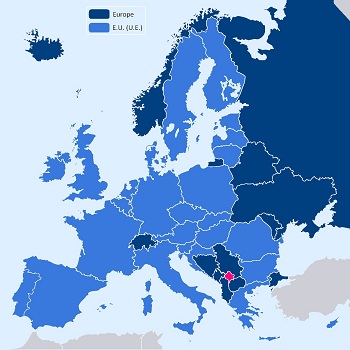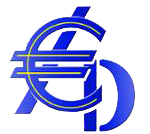 | Kosovo |  |
General data Area: 10,887 km²
Population : 2.2 millions
Density: 220 inhab/km²
Capital: Pristina
Status: country having unilaterally declared its independence in 2008
Languages: Albanian, Serbian, English
Origins: Albanians (92%,), Serbians (5%)
Religions: Muslim (92%), Serbian minority Orthodox
Currency: Euro (choosen by the trust autority -UNO - in 2002) |  |
The area of Kosovo, inhabited by Illyrians, became part of the Roman and Byzantine empires. The Slavic invasion in the 5th and 6th centuries will place the area in the first Bulgarian empire, then (in 1208) in the Serb kingdom of Nemanjic. The most important monasteries are established in the area, Pristina and Prizren are the capitals of the kingdom; Pec is the seat of the autonomous Patriarchate.
The Ottoman invasion is summarized in two essential dates: the battle of Kosovo in 1389 and the final conquest in 1455.
But Austria temporarily will reconquer Kosovo, from 1683 to 1699.
The current drama of Kosovo is related to this period. The Ottomans, having reconquered the country, will exert on Orthodox Serbs a terrible repression. The Patriarch Arsenije III, having escaped to death, will lead 37,000 Serbian families in exile.
The massive exile of the Christians will be compensated by the arrival of Islamized Bosnian population and especially of the Albanian neighbours, converted to Islam. The population became Albanian.
When the Ottoman Empire began its dissolution, Serbia conquered its independence.
It will be the first area which the Serb kingdom will occupy in 1912 at the time of the Balkan wars under the significant name of “Old Serbia”.
When Serbia today protests against an “illegal” secession, the Kosovans answer that the annexation of 1912 was still much more illegal…
The Second World War will see, briefly (1941-1944), the constitution of a “Large Albania” under Italian administration, then German, gathering all the territories of Albanian language. The end of the war will see the return to separation, Enver Hoxha having refused to enter Tito’s Yugoslavia.
If Kosovo becomes independent, it is very improbable that it amalgamates with Albania (in the same way, one had imagined a Romanian-Moldavian fusion…): too much historical and even linguistics separation, the Northern Albanian idiom (Kosovan) not being that of modern Albania.
Naturally incorporated in the Serbian, Croatian and Slovenian kingdom, the province will become an autonomous area of Serbia only in 1946, then province in 1963 (like Vojvodina with its large Hungarian minority) in the second Yugoslavia (the one of Tito). Since 1981, Kosovo claims the status of full republic.
But in 1989, the Milosevic government will cancel autonomies of Kosovo and Vojvodina. In 1990, Kosovo, by the means of a nonofficial Parliament, declares itself independent, and organizes a referendum into 1992 which votes, under the glance of the international community, the independence with 98%.
Ibrahim Rugova is in favour of a peaceful resistance, but he is quickly outnumbered. The Kosovan war (1995/1998) ends with the Serbian capitulation, when NATO forces intervene.
The end of the war involved the return of exiled Albanians, and the exodus of (approximately) 250,000 Serbs of Kosovo.
On June 9, 1999, the Kosovan administration of the always - theoretically - autonomous province of Serbia is entrusted to UNO (Resolution 1244).
Violence did not cease, particularly in 2004.
On October 24, 2005, UNO entrusts to former Finnish President Martti Ahtisaari the mission of submitting a report on the final status of Kosovo.
The Ahtisaari mission worked from February 2006 to March 2007. If the strictly technical subjects easily progressed, the negotiator encountered the absolute Serbian intransigence about any forms of independence. It is quite comprehensible that the situation and the future of Kosovo are a tragedy for Serbia. Our Western mentalities cannot imagine the importance of the historical memory in these Balkan regions. However, how to imagine other solutions than independence for a country composed of 92 % of Albanian, after a terrible war? Thus, on February 17, 2008, the Parliament of the province, gathered in extraordinary session, votes for the text presented by the Prime Minister Hashim Thaçi proclaiming the independence of Kosovo.
As for UNO, the question today does not seem to be to know if Kosovo will be the 193th Member State of UNO, but when it will be!
By its population, Kosovo is close to the Baltic Republics, with an area a little lower than that of Montenegro.
The official language is Albanian, language of closely the entire population, even if the Serb language is that of the small minority, and English the language of the international administration.
Kosovo and the Euro The Official Authorities of UNO chose to adopt the Euro like national currency for Kosovo. Not being member of the EU, this choice doesn’t give it, to date, any specific right (national side particularly). Contact E-mail: pays@amisdeleuro.org Links
Top of page |
 AD€ - Les Amis de l'Euro
AD€ - Les Amis de l'Euro
